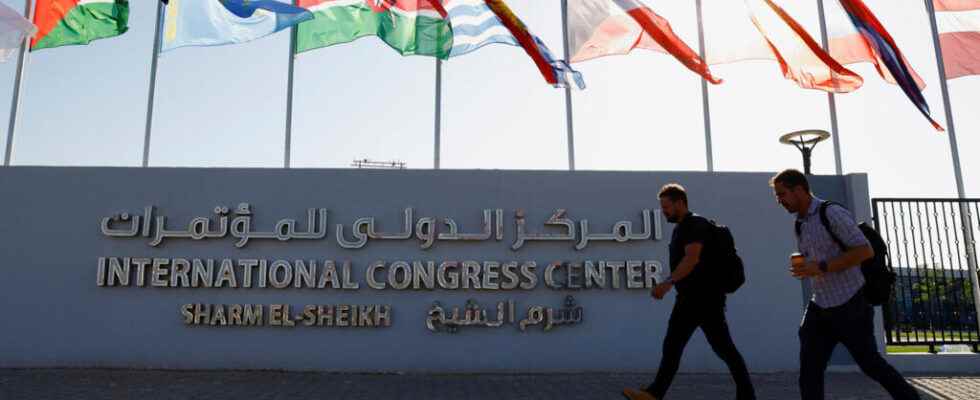The UN climate conference opened on Sunday 6 November in Sharm el-Sheikh in Egypt. This Sunday was decided to officially include the issue of financing the damage caused by climate disasters. More than ever, the financial question will be at the heart of the speeches of the Heads of State and Government this afternoon. A hundred made the trip, those from the South are expected in force.
With our special correspondents in Sharm el-Sheikh, Jane Richard and Claire Fages
Even more than new commitments to reduce greenhouse gas emissions, even more than the necessary transformation of our agricultural systems, our transport or our industries, it is finance that will be at the heart of the discussions of this African COP. , the fifth since 1995. Beyond the alliances that are made and broken up against powers such as the United States or China, the host country, Egypt, has promised the countries of the South will be heard during these 27e climate negotiations.
However, this COP27 opens in a climate of mistrust, which was openly manifested already last year in Glasgow. ” We have been hearing, for several years now, a form of anger from quite a few countries in the South, from governments but also from civil society – which shows that it is not just a political game on the part of governments – which say that the promises of the North are not there sums up Sébastien Treyer, Director General of the Institute for Sustainable Development and International Relations.
The sinews of war is the money that the North has promised the South to help it adapt to the impacts of climate change. But this promise, made in 2009 at COP15 in Copenhagen, to raise 100 billion euros per year for 2020 has not materialized. However, they must be doubled by 2025 and other objectives must be set during this COP.
Because the developed countries are those which, historically the most polluted, by making their industrial revolution. They are now joined by China, the second historical emitter behind the United States.
But it is the poorest countries that often experience the most devastating consequences of rising temperatures.
The question of ecological debt
Also rich countries, which fear having to pay astronomical sums, are increasingly turning to hybrid public-private partnerships, such as Partnerships for a Just Energy Transition (Jet-P). After the one to help South Africa get out of coal, endowed with 8.5 billion dollars, others could emerge around Senegal, Vietnam and Indonesia.
The #COP27 will stick to #CharmElSheikhin #Egypt, from November 6 to 18. What will be the major themes of this meeting? Explanations from our journalists @BrasAnne and @Geraud_BD ⬇️
Follow the latest COP27 news on https://t.co/SpC2xavbVj pic.twitter.com/vLhoA6Sedm
— RFI (@RFI) November 6, 2022
African heads of state on the podium
This Monday morning, just over 100 heads of state and government are expected in Sharm el-Sheikh. Many of them are Africans. They will speak first, from 1:30 p.m. French time, for a maximum of three minutes, in one of the two large plenary rooms of the Sharm el-Sheikh International Convention Center.
After the host president Abdel Fattah al-Sissi, then his successor in 2023 Sheikh Al Nehayan of the United Arab Emirates, will follow the Congolese Denis Sassou Nguesso, the Gabonese Ali Bongo Ondimba, the Bissau-Guinean Umaro Sissoco Embaló, the Tanzanian Samia Suluhu Hassan, the Algerian Abdelmadjid Tebboune or the Central African Faustin Archange Touadera. Macky Sall (Senegal), will speak to him tomorrow morning. Other countries such as Côte d’Ivoire, Gambia, Mali and Angola are represented by their vice-presidents.
Joe Biden, currently held in Washington by the midterm elections to be held tomorrow Tuesday, is expected in Sharm el-Sheikh on November 11.
How can this COP be a success for Africa?
All will plead for greater financial redistribution to help their countries adapt to the vagaries of climate change. But so far, it is the “mitigation of greenhouse gas emissions” component, a priority for rich countries, which has taken the lion’s share.
Africa, the continent most vulnerable to climate change according to the IPCC, hopes for commitments on a specific financing mechanism for “loss and damage” because the damage already suffered by the continent undermines its development efforts by destroying its infrastructure, land or heritage. The point was on the negotiating agenda yesterday for the first time.
Finally, the continent wants help to preserve its forests, particularly in the Congo Basin has become the first lung of the planet. A certain number of events must take place on the issue of carbon sinks in general (ocean, seas, forests, etc.). The Mediterranean is represented by a pavilion for the first time. French President Emmanuel Macron is to take the opportunity to elaborate on the One Forest Summitwhich is to be held in Gabon early next year.
► Read also: COP27: Emmanuel Macron’s good intentions vis-à-vis Africa
Finally, some leaders are calling for a “just transition”: that in the name of the climate, we should not prevent Africa from exploiting its oil and especially its gas when half of its population does not have access to electricity.
► Read also: Pre-COP27 in the DRC: Kinshasa confirms its intention to exploit its oil blocks
